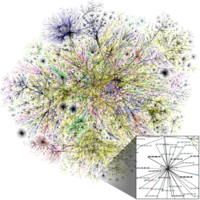
Photo from wikipedia
Abstract People, companies, and institutions form networks as part of their technical, economic, and social activities. As a consequence, these networks have an influence on how companies conduct business. Recently,… Click to show full abstract
Abstract People, companies, and institutions form networks as part of their technical, economic, and social activities. As a consequence, these networks have an influence on how companies conduct business. Recently, the Internet, professional, and scientific social networks have contributed to the ease and simplicity of the network forming process and the public availability of the corresponding data. We investigate whether useful information about the relationships between individuals, companies, and institutions for the domain of production can be extracted from publicly available, structured and unstructured data that is merged from various Internet sources. We demonstrate that relevant information about the structures of these networks can be obtained by merging publicly available data using a combination of advanced computational methods including web crawling, machine learning, and creating mash-ups of publicly available services. The feasibility and the applicability of the approach are shown for a case in the automotive domain. A potential use case of the resulting data is demonstrated, showing how the approach can be used to find specific skills and expertise for a scientific community consisting of people from industry and academia. The proposed approach can be used for the modelling and analysis of various forms of collaboration between and within businesses. As a tool, it could be used for the purposes of strategic networking, to facilitate the creation of project consortia, to identify competitors and other stakeholders in a certain domain, to pinpoint communication channels, to search for specific expertise, or to identify organisational and social structures within organisations.
Journal Title: International Journal of Production Economics
Year Published: 2018
Link to full text (if available)
Share on Social Media: Sign Up to like & get
recommendations!